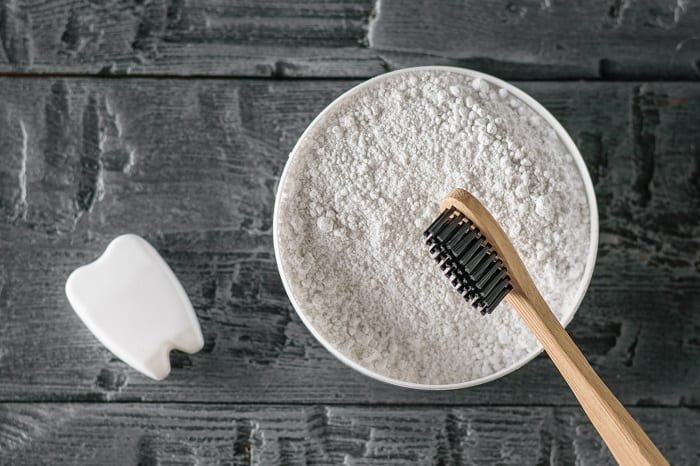Last Updated on October 7, 2024
Should you brush your teeth with toothpowder? Should you use toothpaste? Which one is safer?
One thing a lot of us have in common is that we perform the daily ritual of brushing our teeth. However, what we don’t have in common is what we put on our toothbrush. Tube toothpaste is something you would find on the bathroom shelf of majority of homes, but that’s not to say that there isn’t another option for a clean white dentition.
A toothbrush and good dental care product is what you need to keep your mouth, teeth, and gum clean. Part of the regimen includes using toothpaste or toothpowder to brush twice daily and then rinsing with an antiseptic mouthwash afterward. A lot of us still go a step further to ensure a healthy dentition, by flossing before going to bed.
As with skincare and beauty products, majority of us are beginning to get concerned about our health and opt for cosmetics and dental products of organic origin. Whether or not you choose to make use of toothpaste or toothpowder, what matters is that you avoid using chemical products to clean your mouth.
Table of Contents
What is Tooth Powder?
Tooth powder has been around for all ages, they were more popular among Ancient Egyptians, Romans, Greeks, and Chinese. In the Roman Empire, dental hygiene involved making a grittier powder with the help of oyster shells and crushed bones. They also added charcoal and powdered bark to avoid mouth odor. In parts of Asia, it was the use of ginseng, salt, and herbs as teeth cleaner that was the secret to a sweet-tasting and whitening solution. The Persians were the first to take into account the dangers of using harsh powders that could damage the tooth. With the help of honey, herbs, and snail shells, they were able to create their own safe dental powder.

Toothpowder became a commercial commodity when Britain went into the trade in the 18th century. The main ingredient was baking soda; while others such as cuttlefish and earthenware were included for a more abrasive clean.
The Emergence of Toothpaste
In the 19th century, the addition of glycerin and borax lead to the paste with a foaming effect. It became easier to sell the paste once it was able to get the job done neatly than with powder. After a while, fluoride was included to improve the strength of the tooth and they were packaged in crumpled tubes. That’s how toothpowder lost its popularity.
With the call to ditch fluoride since it can be poisonous if swallowed especially by kids, toothpowder is beginning to gain more space in the toilet cabinet.
Important Ingredients in Toothpowder
The active ingredients in toothpowder include:
- Baking Soda – Baking soda is added to toothpowder because of its abrasive properties and ability to leave the tooth polished.
- Sea Salt – The minerals contained in sea salt are beneficial in healing gum related irritations. In order to ensure that the minerals remain intact, the unrefined variety is more effective as they contain high concentration of the required salt minerals.
- Cloves – Their ability to heal sores makes them an addition for their anti-inflammatory prowess. They also help to improve the taste of the powder.
- Xylitol – Xylitol keeps the mouth moist by ensuring the production of saliva, helping to add minerals to the teeth. It is also useful in making the powder taste better.
- Essential Oils –Essential oil like peppermint oil is added to dental powder as it is a natural antibacterial and antiseptic. It also leaves your mouth with a fresh minty feel after each wash.
- Bentonite Clay – When included in dental powder, bentonite clay attaches to toxins in the mouth, helping to remove stains in the teeth. It also contains minerals that help to nourish the teeth and gum.
- Sage – Sage is common in most parts of the world for it tooth whitening abilities. Hence, it is a natural ingredient in toothpowder.
Concerns about Toothpaste
As mentioned earlier, there is a lot of inquiry into the dangers of using toothpaste especially those that contain toxic chemicals like SLS (Sodium Lauryl Sulfate). Also, there is the problem of suffering from gum sores and injury due to the harsh effect of fluoride which also has negative effects on the organs of the body when swallowed regularly.
This growing concern has led to more sales in organic toothpaste making it a lot difficult for popular household names like Colgate to market their brand. Plus a lot of people have resulted to making their own home-made organic toothpaste and storing for their personal use.
Whether you choose to make your own organic toothpaste or buy from a trusted brand, you should remember that what you truly need is a mouthwash that leaves you with clean white teeth, healthy gums, and a fresh breathe.
Brushing with Toothpowder
There is no specific way to use toothpowder for cleaning your mouth. You can use it the way you make use of your toothpaste; apply it on your toothbrush and brush away. You might need to wet your toothbrush first to ensure that the powder sticks to the brush. After thoroughly cleaning your teeth, for at least 3 minutes, you should rinse off with cool water. We recommend you do this for 2 or 3 times daily for a clean white teeth and sweet-smelling breathe.
Between Toothpaste and Toothpowder
You can choose to use toothpowder for your dental hygiene or in addition to toothpaste. They both contain ingredients that are helpful to your dental health. All that’s important is that you maintain a strict oral health regimen which includes
- Brushing your teeth at least twice a day. Once in the morning after you get up from bed and at night before you go to sleep.
- Keep bacteria away and gums healthy by flossing regularly.
- Do not use a toothbrush for more than a period of 3 months.
- Avoid using dental products that contain SLS and other toxic chemicals that can damage your dentition.
- Check with a dentist regularly.
Toothpowder and toothpaste are both effective when it comes to teeth cleaning and can both be included in your bathroom cabinet for use together or interchangeably. You should ensure that you check for reviews when shopping for dental products online to hear what others are saying about the product before you buy.
Which product do you use and why? Kindly let us know in the comment section. Also, if you find this article to be helpful, feel free to share it with others too.

Lacey is an environmental enthusiast and passionate advocate for living green and sustainable. She believes that everyone can make a difference, no matter how small. Lacey is dedicated to reducing her own carbon footprint and educating others on the importance of living greener. She is an advocate for green energy and sustainable practices. She is an active member of her local community, volunteering with local conservation efforts, and taking part in sustainability initiatives. Lacey is a firm believer that the only way to ensure a sustainable future is to work together and make small, but important changes.

